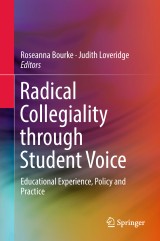Details

Radical Collegiality through Student Voice
Educational Experience, Policy and Practice|
CHF 118.00 |
|
| Verlag: | Springer |
| Format: | |
| Veröffentl.: | 17.08.2018 |
| ISBN/EAN: | 9789811318580 |
| Sprache: | englisch |
Dieses eBook enthält ein Wasserzeichen.
Beschreibungen
<p>This book celebrates the rights of the child, through including student voice in educational matters that affect them directly. It focuses on the experiences of children and young people and explores how our educational policies, practices and research endeavours enable educators to help young people tell their own stories. The respective chapters illustrate how listening to young people can help them attain new positions of power, even though doing so often creates discomfort and requires a radical change on the part of the adult establishment. Further, the book challenges researchers, teachers and practitioners to reconsider how students are involved in research and policy agendas, and to what extent radical collegiality can create fundamental and positive changes in the lives of these learners.</p><p> </p>In recent decades, greater attention has been paid across policy, practice and research discourses to involving children more meaningfully and actively in decisions about theirparticipation in both formal and informal educational settings. The book’s goal is to illustrate how researchers have systematically involved students in the pursuit of a richer understanding of educational experiences, policy and practice through the eyes and ears of young people, and through their own cultural lens.<p></p><p></p><p></p><p></p>
<p>Chapter 1. Using student voice to challenge understandings of educational research, policy and practice.- Chapter 2. Tracing the evolution of student voice in Educational Research.- Chapter 3. Voice and the ethics of children's agency in educational research.- Chapter 4. Representing youth voices in indigenous community research.- Chapter 5. Marginalised youth speak back through research: Empowerment and transformation of educational experience.- Chapter 6. Challenges of student voice within a context of threatened identities.- Chapter 7. Gathering and listening to the voices of Māori students: What are the system responses?.- Chapter 8. Foregrounding the stories of secondary school students with disabilities.- Chapter 9. Students' voice shifting the gaze from measured learning to the point of learning.- Chapter 10. Beyond the official language of learning: Teachers engaging with student voice research.- Chapter 11. Student voice, citizenship and regulated spaces.- Chapter 12. Teachers and Power in Student Voice: 'Finger on the Pulse, Not Children Under the Thumb'.</p>
<div><p>Roseanna Bourke is an Associate Professor of Learning and Assessment at the Institute of Education, Massey University, New Zealand. Roseanna is a registered teacher and psychologist and researches in the areas of learning and assessment, student voice, informal and everyday learning, applied professional ethics, and the impact of institutionalised practices on student learning. She was the co-principal investigator of a 3-year TLRI research study on the impact of children’s everyday learning on teaching and learning in classrooms (2015-2017). She is an Associate Editor of the International Journal of Student Voice Research and former Co-Editor of the New Zealand Journal of Educational Studies. Roseanna is interested in helping students, teachers, psychologists and parents embrace a broader concept of learning to ensure that young people’s learning identity is not narrowed through a curriculum-specific lens.</p></div><div>Judith Loveridge is a senior lecturer at Victoria University of Wellington. She is particularly interested in the intersection between social and cultural processes and individuals’ learning and development. Her major on-going area of research concerns the ways in which children and adults learn and develop through their experiences of implicit cultural practices, as well as through the experiences they have as a result of explicitly stated educational goals and pedagogical philosophies and practices. This theme has been addressed through research examining young children’s learning in home, community and educational settings, children’s enculturation, home, centre and school relations, and adults’ learning in informal contexts. A related research interest is the question of how to appropriately and authentically involve children and young people in research. Ensuring that the diversity of groups’ and individuals’ experiences is given expression has been another important theme in her research.<br></div>
<p>This book celebrates the rights of the child, through including student voice in educational matters that affect them directly. It focuses on the experiences of children and young people and explores how our educational policies, practices and research endeavours enable educators to help young people tell their own stories. The respective chapters illustrate how listening to young people can help them attain new positions of power, even though doing so often creates discomfort and requires a radical change on the part of the adult establishment. Further, the book challenges researchers, teachers and practitioners to reconsider how students are involved in research and policy agendas, and to what extent radical collegiality can create fundamental and positive changes in the lives of these learners.</p><p> </p>In recent decades, greater attention has been paid across policy, practice and research discourses to involving children more meaningfully and actively in decisions about theirparticipation in both formal and informal educational settings. The book’s goal is to illustrate how researchers have systematically involved students in the pursuit of a richer understanding of educational experiences, policy and practice through the eyes and ears of young people, and through their own cultural lens.<p></p><p></p><p></p>
Identifies diverse ways to include young people in research and in decisions concerning educational practices and policies Questions conventional assumptions about young people’s roles and experiences within their schools and local communities Examines how educational policies and practices can allow educators to help young people tell their own stories Considers to what extent radical collegiality can create fundamental and positive changes in the lives of young learners
Diese Produkte könnten Sie auch interessieren:

Community Schools in Africa

von: Deborah Glassman, Chloe O'Gara, Kristin Helmore, Jordan Naidoo, Fred Wood

CHF 59.00















